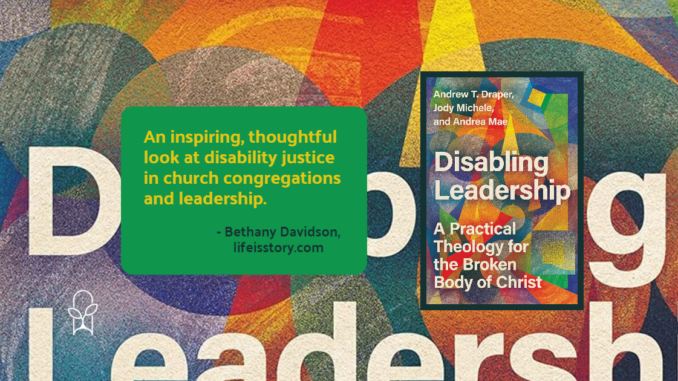
Published by IVP Academic on December 12, 2023
Genres: Academic, Non-Fiction, Christian Life, Theology, Social Justice
Buy on Amazon
Goodreads

People with disabilities are often excluded from full participation in church communities. Accessibility is a key component of the biblical ministry of reconciliation―but it's not enough. To truly work toward reconciliation, churches must both consider the theological implications of disability and also become places where people with disabilities lead.
Disabling Leadership presents a practical theology of disability for thoughtful church leaders and congregants. Written by practitioners and a scholar-pastor who are engaged in ministry together, this book encompasses cutting-edge theological ethics as well as stories of how such commitments are embodied in a real church community. The authors equip readers to explore key themes such as:
what it means to be human
how to understand suffering and healing
how churches can be welcoming and accessible communities
how to face common challenges and issues in resisting ableismDisabling Leadership moves beyond paternalistic views of disability that seek to extract "inspiration" from another's story without engaging in the difficult work of just and dignifying relationships. When we foster genuinely inclusive leadership teams, the authors contend, our churches will be less likely to treat anyone as a "project" and will better reflect God's love as the body of Christ.
This unique book shares theological insights and practical ideas for how churches can empower people with disabilities to take leadership roles in the church. The authors reflect on how well-meaning disability ministries often end up segregating the body of Christ, and they explore different definitions and elements of what leadership means. They argue that instead of thinking about Christian leadership through the lens of charisma and familiar, immediately recognizable capabilities, we should recognize and honor all of the ways that members of Christ’s body honor him and share gifts of grace with their communities. The authors share helpful short histories of disability rights and disability theology, and they highlight ways that Christians can learn from people with disabilities, instead of seeing them as a group that needs to be cured or rescued.
Andrew T. Draper, Jody Michele, and Andrea Mae each write from their own vantage points, based on their experiences with the church and with different forms of visible and invisible disabilities. Although Disabling Leadership: A Practical Theology for the Broken Body of Christ is academic in its overall content and tone, their personal perspectives engage readers and will help this reach a broader audience. Also, even though the book has a very academic feel when they are laying groundwork by reviewing previous literature, defining terms, and exploring theological concepts, the second half of the book includes lots of practical reflections about church life and leadership, sharing stories and ideas for how churches can become more inclusive and balance different needs. The authors also share advice for how leaders can present this issue to their congregations in ways that encourage buy-in and participation.
Although I agreed with most of the theological reflections in this book, I took issue with some of the authors’ arguments about the nature of disability. They argue that disability isn’t a result of the fall, but is part of God’s original design for diversity in the world. As a result, they believe that even though people will not experience pain or suffering in their resurrected bodies, disabilities may persist in the new heaven and new earth. At times, they present this as a thought experiment, and they point out how some common beliefs in Christian culture are based in assumptions, not clear biblical evidence. Other times, they take a stronger stance against disability being a consequence of the fall.
One of the authors cites Jesus’s words from when he healed the blind man, believing that since Jesus said that this man wasn’t blind because of his own or his parents’ sin (John 9:3), this means that blindness isn’t a consequence of the fall. That doesn’t fit with the text at all. Jesus was simply teaching that disability isn’t a form of karmic retribution. Overall, I felt that the authors never presented a clear biblical argument for their belief. They mainly base this idea in pragmatism and personal feelings, and they don’t engage with the best or most Bible-based arguments for the opposing view.
I can certainly see why someone who was born with a certain disability may feel that it is an inextricable part of who they are, and I can go along with the thought experiment of some disabilities and differences persisting in resurrected bodies, but it is absolutely not necessary to take the authors’ view in order to love, honor, and receive leadership from people with disabilities. Also, I think that their argument sidelines people who have become disabled due to illness or tragedy, and who look forward to regaining lost abilities in their resurrected bodies someday. Since the authors base so much of their argument in people’s feelings and self-perceptions, I thought they should have better acknowledged this side of it.
Even though I was disappointed with that element, I found Disabling Leadership very thought-provoking, and it was helpful for me to think through and process what I agree and disagree with. More importantly, the authors share a wealth of wisdom about how churches can better reflect the body of Christ in its fullness, fully including disabled people in the life of the church without segregating them or treating them as projects. There are lots of helpful ideas here for how churches can become more accessible and have more welcoming and inclusive attitudes, and I especially appreciated the insights into how churches can bring disabled members into decision-making processes and leadership teams. Despite my areas of disagreement with the authors, I greatly appreciated the majority of this book and would recommend it for the unique perspectives, theological encouragement, and practical advice that it offers.
